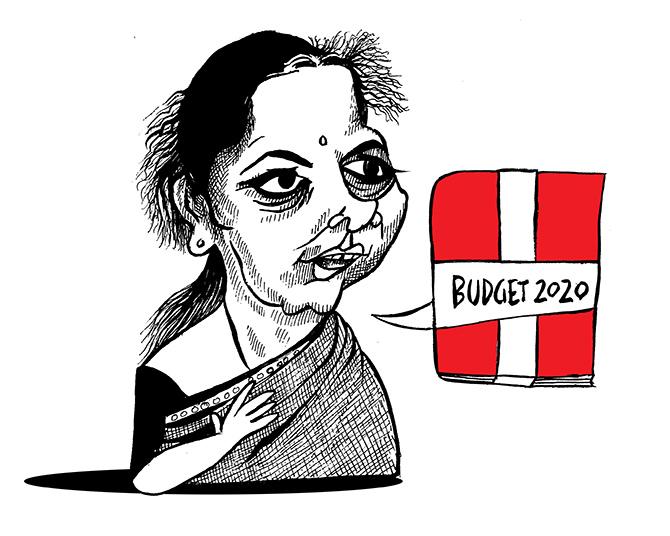Despite a slowing economy, the Budget does not envisage any major stimulus through the budgeted fiscal deficit figures, said Goldman Sachs.

Most foreign and domestic brokerages have given a thumbs-down to the Budget 2020 proposals unveiled last week and called it a missed opportunity for the government to revive economic growth.
Auguring that the proposals will not be able to lift economic sentiment as measured by the gross domestic product (GDP), they see more pain for the economy - at least in the short-to-medium term.
While the markets showed their displeasure during the special trading session on Saturday with the S&P BSE Sensex slipping nearly 1,000 points - their worst Budget-day showing since 2009, they remained range-bound in trade on Monday.
Here is what leading brokerages said.
Morgan Stanley
The budget provides a more transparent set of fiscal accounts, focuses on improving quality of expenditure with capex-driven spending and raising resources through asset sales.
The fiscal deficit target indicates marginal consolidation, which looks achievable.
It may have missed the opportunity to significantly lift availability of risk capital by not removing long-term capital gains tax.
The budget does not provide help for the ailing rural economy and implies that growth may not show a V-shaped recovery.
It also falls short on laying down a bigger privatisation agenda.
The market expressed disappointment since expectations around these may have been high.
We continue to prefer domestic cyclical midcap value stocks.
Goldman Sachs
Despite a slowing economy, the budget does not envisage any major stimulus through the budgeted fiscal deficit figures, with the FY21 targeted fiscal deficit to decline to 3.5 per cent of GDP, compared to 3.8 per cent of GDP for FY20.
With budgeted nominal GDP growth of 10 per cent y-o-y and gross tax revenue growth of 12 per cent y-o-y, the implied tax buoyancy stands at 1.2 which continues to appear ambitious versus the 0.5 tax buoyancy achieved in FY20.
Unless there is a sharp increase in tax compliance, we think it is quite likely that the government will have to cut current spending, as was the case in FY20.
Nomura
Given fears of an outright fiscal stimulus, the budget is prudent relative to expectations.
We see a potential revenue disappointment of around 0.5 per cent of GDP, which will likely result in lower spending and a partial fiscal slip.
We expect a fiscal deficit of 3.7 per cent of GDP in FY21, a slip of 0.2 percentage points.
Overall, the budget appears to avoid growth short-cuts in favor of more durable growth drivers.
Execution of this intent remains the key risk.
We see the budget as largely neutral for growth and inflation.
A prolonged deleveraging cycle and a clogged financial sector mean that any growth recovery from the current downturn will take much longer.
We expect GDP growth to slow further to 4.3 per cent in Q4 2019 from 4.5 per cent in Q3, and see a below-trend growth of 5.7 per cent in FY21 from 4.7 per cent in FY20.
BofA Securities
Equity market’s expectations of a significant growth push - through either major tax cuts (individual, capital gains), or real estate stimulus did not come through.
To be fair, the government did provide some tax relief to individuals, but that is limited in size and comes at a cost.
We think the markets' disappointment with the budget will last a short while, post which MSCI India should continue to move with emerging markets (EM).
The recent mid-cap excitement could lose steam though.
Indian GDP growth should improve on base effects, monetary stimulus and an auto sales recovery. Investors now have to revert to focusing on top down US Fed-driven global liquidity/risk appetite trends, and bottom up profit after tax (PAT) numbers.
Motilal Oswal
From the economy perspective, in sharp contrast to expectations, there were no major boosts to consumption as we had hoped.
Another concern is that investments by the government and central public sector enterprises (CPSEs) are budgeted to remain stagnant in financial year 2020-21 (FY21).
With the fiscal policy accepting its limits and the inefficacy of monetary easing, a meaningful economic revival may not pan out next year.
Edelweiss Securities
FY20 revenues are still assuming sharp buoyancy in Q4FY20, which may not come through, and, therefore, could necessitate expenditure rationalisation.
That said, FY21 tax collections growth budgeted at 12 per cent YoY looks reasonable.
It’s the optimism on non-tax collections front (telecom, divestments) that may challenge the fiscal math.
Overall, from a business cycle standpoint, aggregate fiscal push is missing.
We think, given weak demand, consolidation could have waited.
Thus, the economy, at best, will see a modest bounce aided by liquidity easing, normalisation in farm cash flows amid rising food inflation, and stabilisation in exports. But the virtuous economic cycle may still be distant.













 © 2025
© 2025